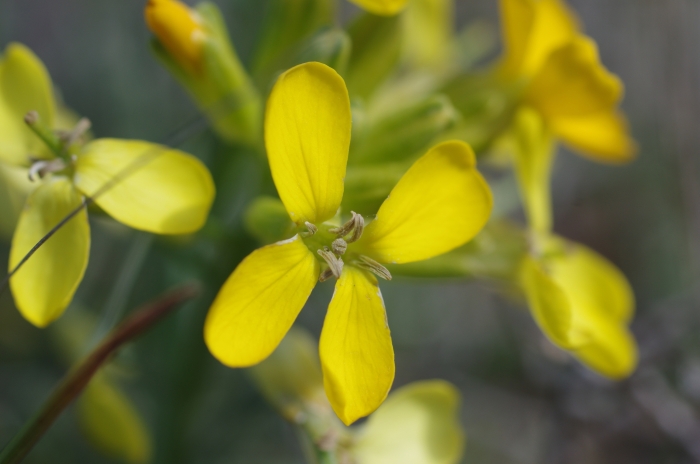Franciscan Wallflower
(Erysimum franciscanum)
Franciscan Wallflower (Erysimum franciscanum)
/
/

Rick Mandel
CC BY 4.0
Image By:
Rick Mandel
Recorded By:
Copyright:
CC BY 4.0
Copyright Notice:
Photo by: Rick Mandel | License Type: CC BY 4.0 | License URL: http://creativecommons.org/licenses/by/4.0/ | Rights Holder: Rick Mandel | Publisher: iNaturalist | Date Created: 2021-03-06T13:35:19-08:00 |
























Estimated Native Range
Summary
Erysimum franciscanum, commonly known as Franciscan wallflower, is a biennial or short-lived perennial herb native to coastal bluffs and rocky outcrops in northern California, particularly in the San Francisco Bay Area. It typically grows to a height of 1-2 feet (0.3-0.6 meters) and is noted for its narrow, lance-shaped leaves and upright growth habit. From late winter to late spring, it produces clusters of fragrant, cream-colored to yellow flowers that are highly attractive to pollinators such as bees and butterflies.
The Franciscan wallflower is valued for its extended blooming period and its ability to thrive in challenging conditions, including serpentine soils, which are often toxic to other plants. It is a suitable choice for rock gardens, coastal gardens, and native plant landscapes, where it adds color and supports local wildlife. Gardeners should provide full sun and well-drained soil to mimic its natural habitat. While it is drought-tolerant once established, regular watering will encourage more vigorous growth and flowering. This species is relatively low-maintenance but may be short-lived; however, it can reseed itself under favorable conditions. In cultivation, it is also monitored at the Presidio of San Francisco for conservation purposes.CC BY-SA 4.0
The Franciscan wallflower is valued for its extended blooming period and its ability to thrive in challenging conditions, including serpentine soils, which are often toxic to other plants. It is a suitable choice for rock gardens, coastal gardens, and native plant landscapes, where it adds color and supports local wildlife. Gardeners should provide full sun and well-drained soil to mimic its natural habitat. While it is drought-tolerant once established, regular watering will encourage more vigorous growth and flowering. This species is relatively low-maintenance but may be short-lived; however, it can reseed itself under favorable conditions. In cultivation, it is also monitored at the Presidio of San Francisco for conservation purposes.CC BY-SA 4.0
Plant Description
- Plant Type: Shrub, Herb
- Height: 1-2 feet
- Width: 1-2 feet
- Growth Rate: Moderate
- Flower Color: White, Yellow
- Flowering Season: Spring, Summer, Winter
- Leaf Retention: Evergreen
Growth Requirements
- Sun: Full Sun
- Water: Low, Medium
- Drainage: Medium
Common Uses
Butterfly Garden, Drought Tolerant, Low Maintenance, Rock Garden, Showy Flowers
Natural Habitat
Coastal bluffs and rocky outcrops in northern California
Other Names
Common Names: Franciscan Wallflower
Scientific Names: , Erysimum franciscanum, Erysimum franciscanum var. crassifolium, Erysimum franciscanum var. franciscanum,
GBIF Accepted Name: